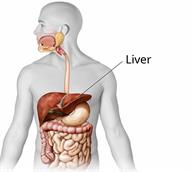Hepatitis C: What to Know

Hepatitis C is a liver infection that's caused by a germ, also called a virus. The germ can spread from person to person. This means it's contagious.
The infection causes irritation and swelling in the liver. Many people have no symptoms or only mild symptoms. People with hepatitis C often don't know they have it for months or years.
Over time, the infection can lead to serious liver problems.
What are the causes?
This condition is caused by a germ. Most often, the germ spreads through contact with blood.
The germ doesn't spread when a person sneezes or coughs.
What increases the risk?
- Having contact with needles or syringes that have the germ on them. This may happen when:
-
Having sex with someone who is infected. The germ can spread through vaginal, oral, or anal sex.
-
Getting kidney dialysis. This is treatment to clean your blood.
-
Having a job that puts you in contact with blood or body fluids, such as in health care.
-
Having HIV or AIDS.
What are the signs or symptoms?
-
Not wanting to eat as much as normal.
-
A fever.
-
Feeling tired.
-
Throwing up or feeling like you may throw up.
-
Belly pain or joint pain.
-
Dark yellow pee (urine), light-colored poop, or both.
-
Jaundice. This is when your skin or the white parts of your eyes turn yellow.
-
Itchy skin.
Often, there are no symptoms.
How is this diagnosed?
This condition is diagnosed based on:
A physical exam.
Your medical history.
Blood tests.
An ultrasound.
How is this treated?
Treatment may depend on your condition and whether you have liver damage. Treatment may include:
Taking antiviral medicines and other medicines.
Having follow-up treatments every 6–12 months for liver problems.
Getting a new liver from a donor. This is called a liver transplant.
Follow these instructions at home:
Medicines
-
Take medicines only as told.
-
If you were given an antiviral medicine, take it as told. Do not stop taking it even if you start to feel better.
-
Do not take:
Activity
-
Rest as needed.
-
Use a condom every time you have vaginal, oral, or anal sex.
-
Ask what things are safe for you to do at home. Ask when you can go back to work or school.
-
Avoid swimming and using hot tubs until your provider says this is OK.
Eating and drinking
General instructions
-
Do not share toothbrushes, nail clippers, or razors.
- Wash your hands often with soap and water for at least 20 seconds. If you can't use soap and water, use alcohol-based hand sanitizer. Make sure you wash your hands:
After you use the bathroom.
After you change diapers.
Before you touch food or water.
-
Cover any cuts or open sores on your skin. This helps keep you from spreading the germ.
-
Keep all follow-up visits. You may need follow-up visits every 6–12 months.
To learn more, go to these websites:
- Centers for Disease Control and Prevention at CDC.gov. Then:
Click "Search" and type "hepatitis C."
Find the link you need.
Contact a health care provider if:
-
Your symptoms get worse.
-
You have new symptoms.
This information is not intended to replace advice given to you by your health care provider. Make sure you discuss any questions you have with your health care provider.
